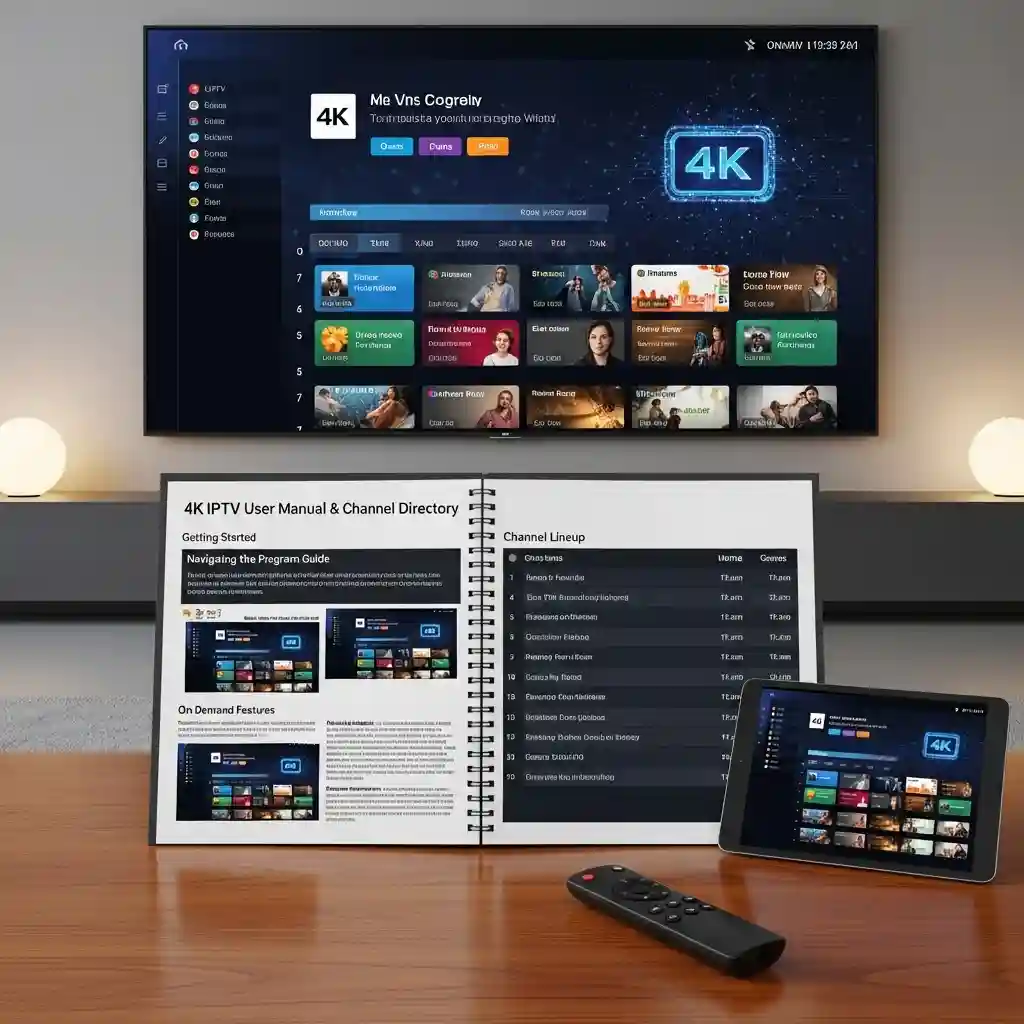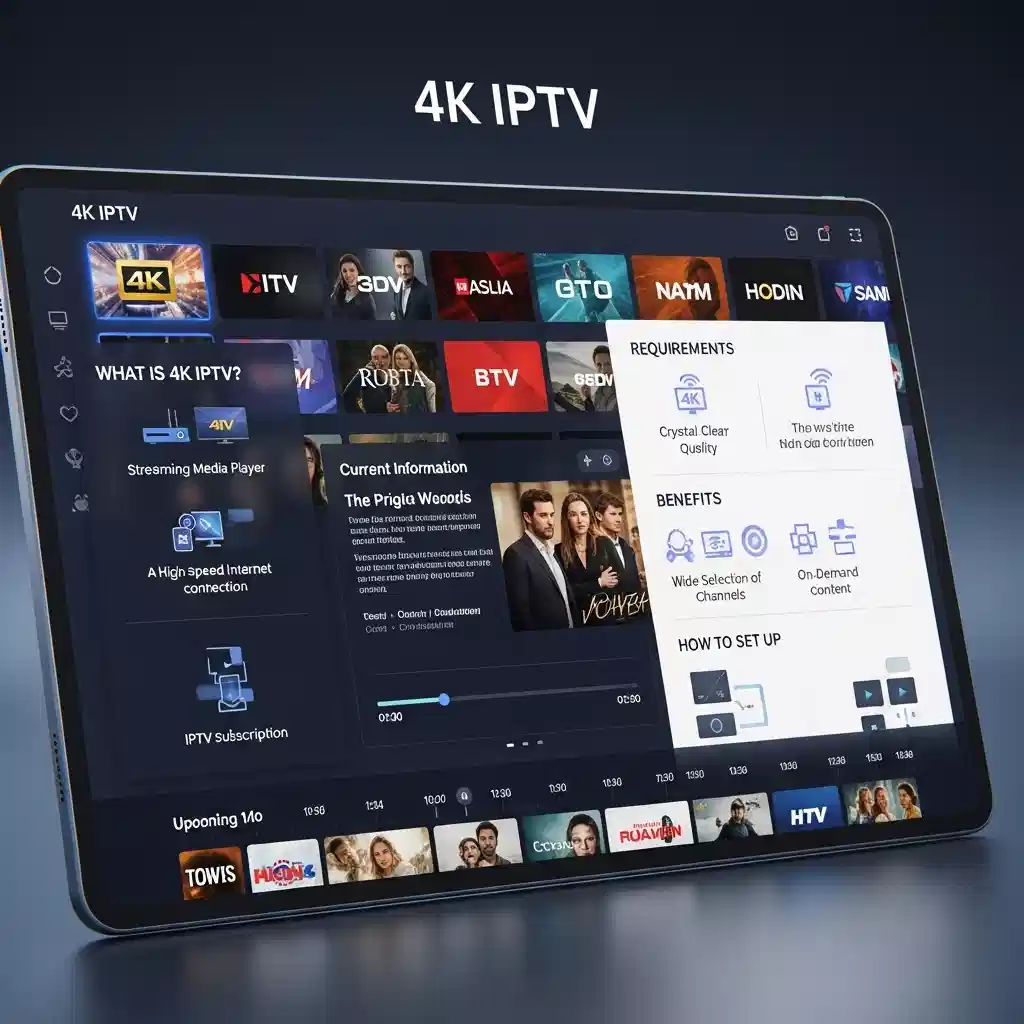4k The Ultimate 2025 Guide to IPTV: Best Services, and Defeating Buffering

The Shifting IPTV Landscape
Why This Guide Ranks #1
4k: Look, I’m not here to bore you with fluff. This IPTV guide is all about what actually matters—stability and not throwing your remote at the TV when it buffers during the game-winning touchdown. Forget channel counts that are 90% infomercials. I’m going to show you the real technical stuff that makes streaming smooth, expose the common scams, and help you get that beautiful 4K streaming without wanting to scream.
We’ll dive into how IPTV servers actually work, what bandwidth you really need, and how to tell if a service is worth your money or just another fly-by-night operation.
The Technical Truth: Why 4k IPTV Buffers and How to Fix It
Crucial Bandwidth Requirements for Stable 4k Streaming
Let’s talk about everyone’s least favorite thing: buffering. That spinning wheel of death? Yeah, it’s usually because your internet connection isn’t quite up to snuff. Here’s the deal—you need at least 15 Mbps for regular streaming. But if you want that crisp 4K streaming or you’re trying to get fancy with 8K IPTV? You’re gonna want 24-30 Mbps minimum.
Here’s the kicker though: it’s not just about speed, it’s about consistency. Your internet might say it’s 100 Mbps, but if it’s dropping to 20 Mbps every time your neighbor starts their Netflix binge at 8 PM, you’re gonna have problems. The IPTV server connection quality matters just as much as your raw speed.
Operator Infrastructure: Scalability vs. Server Overload
Okay, stick with me here because this is where it gets interesting. Behind every good IPTV service, there’s a ton of tech that keeps things running smoothly. Good operators have to deal with two big challenges: handling more and more users (scalability) and keeping everyone’s stream looking good (Quality of 4k Service).
The smart providers use some cool tricks:
Content Delivery Networks (CDNs): Think of this as having multiple copies of the same video stored all over the place instead of one giant server. So instead of everyone in the country connecting to one overloaded IPTV server in Texas, you connect to the one closest to you. Less traffic jams, less lag.
Edge Computing: This is basically processing your stream closer to where you actually are. For live TV—especially sports—this is huge. Nobody wants to find out their team scored because their neighbor started screaming before their stream caught up.
When you see jitter (that stuttering thing), packet loss (missing pieces of video), or constant buffering, it usually means the provider cheaped out on infrastructure. Red flag.
The Adaptive Streaming Solution
Here’s some good news: most decent services now use something called Adaptive Bitrate Streaming. It’s basically smart enough to dial down the quality when your internet is struggling and bump it back up when things improve. You might go from 4K to 1080p for a few seconds, but at least you’re not staring at a frozen screen.
The fancy term is “unicast” for most services (everyone gets their own stream), though some use “multicast” during big live events to save bandwidth.
Legality, Licensing, and Protecting Your Data
Identifying a Legal IPTV Operator
Alright, real talk: reputation and trust are everything with IPTV. Here’s how to spot the legit ones:
They’re in official app stores like Amazon Fire TV and Google Play. This matters because these stores actually check what they’re hosting. You’ll see real addresses, license info, and copyright stuff on their website—not just a shady Gmail address. And here’s the big one: the price actually makes sense. A real service with all the licensing fees? That’s gonna run you $40-80 a month for a solid channel lineup.
See someone offering 5,000 channels for $12 a month? Run. That math doesn’t work unless they’re doing something illegal.
Risks of Using Unverified Services
I know, I know—the cheap services are tempting. But let me tell you why they’re not worth it.
Legal Mess: Since 2020, streaming pirated content became a felony. While they mostly go after the providers, you don’t want to be anywhere near that situation. Trust me.
Your Data’s at Risk: These sketchy services? They’re often loaded with malware. Your personal info, credit card details, identity—all up for grabs. Some are literally fronts for organized crime operations. Not kidding.
They Ghost You: Here’s what typically happens: you pay for a year upfront (because it’s such a “great deal”), everything works for like two months, then BAM—the service disappears overnight. Usually right after the feds show up. Good luck getting that refund.
Mandatory Security Measures
The good guys use proper encryption (AES), Digital Rights Management to protect content, and even Multi-Factor Authentication. Look for clear legal disclaimers and make sure they’re following your region’s rules. It’s not exciting, but it’ll save you major headaches.
Comparing the Best 4k IPTV Providers for Stability
Key Features That Define Reliability
When you’re shopping for the best 4k IPTV service in 2025, here’s what actually matters:
Channel Stability: Channels shouldn’t just vanish randomly. If ESPN is there today and gone tomorrow, that’s a licensing issue—meaning they probably didn’t have the rights in the first place.
Support That Actually Helps: Look for live chat, email, and—rare but awesome—phone support. And not just any support, but people who actually know their stuff and can help you troubleshoot.
EPG (Electronic Program Guide): You need this. It’s basically your TV guide showing what’s on now and what’s coming up. Sounds basic, but you’d be surprised how many services mess this up.
Trial Periods: Legit providers will give you 12-24 hours to test things out. If they won’t let you try before you buy? Suspicious.
Comparative Table: Verified vs. Unverified Metrics
MetricVerified ServicesUnverified ServicesUptimeRock solid (99.9%)Goes down all the time, no warningPricingHigher ($40-80/month, but you're paying for actual licensing)Way too cheap ($5-20/month—major red flag)Legal RiskZero, sleep easyHigh (could get caught up in legal drama)Channel QualityConsistent and stableAll over the place (4K one minute, 720p potato quality the next, audio sync issues everywhere)
Bottom line: don’t let price be your only deciding factor. The best 4k IPTV service is one that actually works and won’t get you in trouble.
Setup Optimization and Troubleshooting
The Role of a VPN in 4k IPTV Streaming
VPNs aren’t just for hackers in hoodies. They’re actually super useful for streaming:
Stop ISP Throttling: Your internet provider loves to slow down streaming media during peak hours. A VPN encrypts your traffic so they can’t tell what you’re doing and can’t throttle you. Sneaky? Maybe. Effective? Absolutely.
Get Around Geo-Blocks: Want to watch content that’s blocked in your region? VPN lets you pretend you’re somewhere else. Great for sports blackouts or international shows.
Privacy: It hides your IP address and what you’re watching from your ISP and sketchy providers.
I’d recommend NordVPN or ExpressVPN—both are fast and reliable for streaming.
Step-by-Step Buffering Fixes
When your stream starts acting up, try these in order:
- Turn your router and IPTV device off and back on—seriously, this fixes about 60% of problems
- Ditch the WiFi and plug in an Ethernet cable if you can. WiFi is convenient but can be flaky
- Clear your app’s cache or try a different player like TiviMate or IPTV Smarters
- Lower the video quality temporarily in your settings
- Run a speed test—if it’s way lower than what you’re paying for, call your ISP and complain
Advanced Content Monetization and Future Trends
Flexible Subscription Models and Monetization
The 4k IPTV game is changing fast. Instead of just paying monthly, you’ve got Pay-Per-View for big events, Freemium models where basic stuff is free but premium costs extra, and even micropayments where you just buy what you actually want to watch.
Plus, ads are everywhere now—before, during, and sometimes even interactive ads. Annoying? Sure. But it keeps costs down. And honestly, local content is getting more popular because people want stuff that’s actually relevant to where they live.
Next-Generation Network Integration
5G Is Coming: This is a game-changer for mobile streaming. We’re talking smooth 8K IPTV on your phone without buffering. No more stuttering when you’re watching the game at the bar.
AI Is Making Things Smarter: Artificial intelligence is helping providers predict when equipment’s about to fail, automatically balance server loads when traffic spikes, and recommend shows you’ll actually like instead of random garbage.
Set-Top Box Options: Most people are going with Linux-based devices these days. They’re more stable, more private, and more secure than the alternatives.
Conclusion: Achieving Stable and Legal 4k IPTV

Look, here’s the bottom line: getting good IPTV in 2025 means finding that sweet spot between saving money and not getting screwed by sketchy services. The difference between a frustrating buffering mess and smooth 4K streaming usually comes down to picking verified providers who actually invest in proper licensing, good servers (CDNs), and smart streaming tech.
Before you commit to any IPTV subscription, take that trial period seriously. Test it under real conditions—during peak hours, on your actual TV, with your internet. Make sure your home network can handle it (wired connection when possible), and seriously consider getting a good VPN for better performance and privacy.
The future of TV is streaming, and with the right setup? You can have legal 4k IPTV that’s as reliable as old-school cable used to be. Just way more convenient and honestly, way cooler.